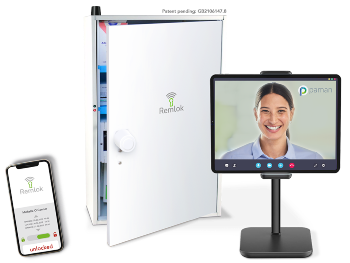
A new remotely operated, secure medicine cabinet has today been launched by the UK’s leading medication support company, PAMAN.
REMLOK has been developed for those at risk of accidental or deliberate overdose, and those at risk of self-harm.
All PAMAN pharmacy technicians are trained and registered with the Pharmaceutical Society and General Pharmacy Council.
Norman Niven, CEO at PAMAN, commented: 'REMLOK is part of our on-going product development programme designed to support people with mental health issues who are living in the community.
'We are dedicated to finding ways of helping those people, and we strongly believe that our medication monitoring service is a key part of this.'
REMLOK will also help address medication non-adherence, which is when patients unintentionally or deliberately do not take their medicine, a huge global issue that costs health services an enormous amount of money and leads to poorer health outcomes.
According to statista, community pharmacies dispensed over a billion prescribed items in England in 2023-24, an average of 20 items for every person.
However, the landmark 2003 World Health Organization report on adherence estimated that patients do not take between 30 and 50 per cent of medicines prescribed for long-term conditions.
Niven added: 'Far too many people simply don’t take the medicines they have been prescribed. This causes the immediate problem that they are likely to need another GP appointment, or be admitted or re-admitted to hospital.
'Whatever the cause, many studies have shown that adherence rates can be improved by the simple act of monitoring patients at the time their meds are due.'
 |
| © PAMAN |
The problem has become more acute in recent years as we have an ageing population, which means an unavoidable increase in people simply forgetting to take their meds.
However, intentional non-adherence is the real problem.
The conclusions from a major European review of intervention studies (comparing their effectiveness), noted that 'electronically monitored adherence feedback is potentially an effective approach to enhancing medication adherence.'
Non-adherence is a major issue for those with mental health issues.
Niven continued: 'People with mental health issues often encounter challenges that can hinder their ability to take their prescribed medications. This can lead to poorer treatment outcomes, increased symptom severity, and a higher risk of relapse.
'Many experience cognitive impairments that affect their memory. This can make it challenging for them to remember to take their medication. And many have complex medication regimes.
'Overdosing, both accidental and intentional, is a significant concern.'
The PAMAN system replaces the need for home carers, who would otherwise be required to visit patients at home each and every time their meds were to be taken, a virtually impossible task both logistically and financially.
For more information about PAMAN and REMLOK, visit https://paman.org.uk/.













